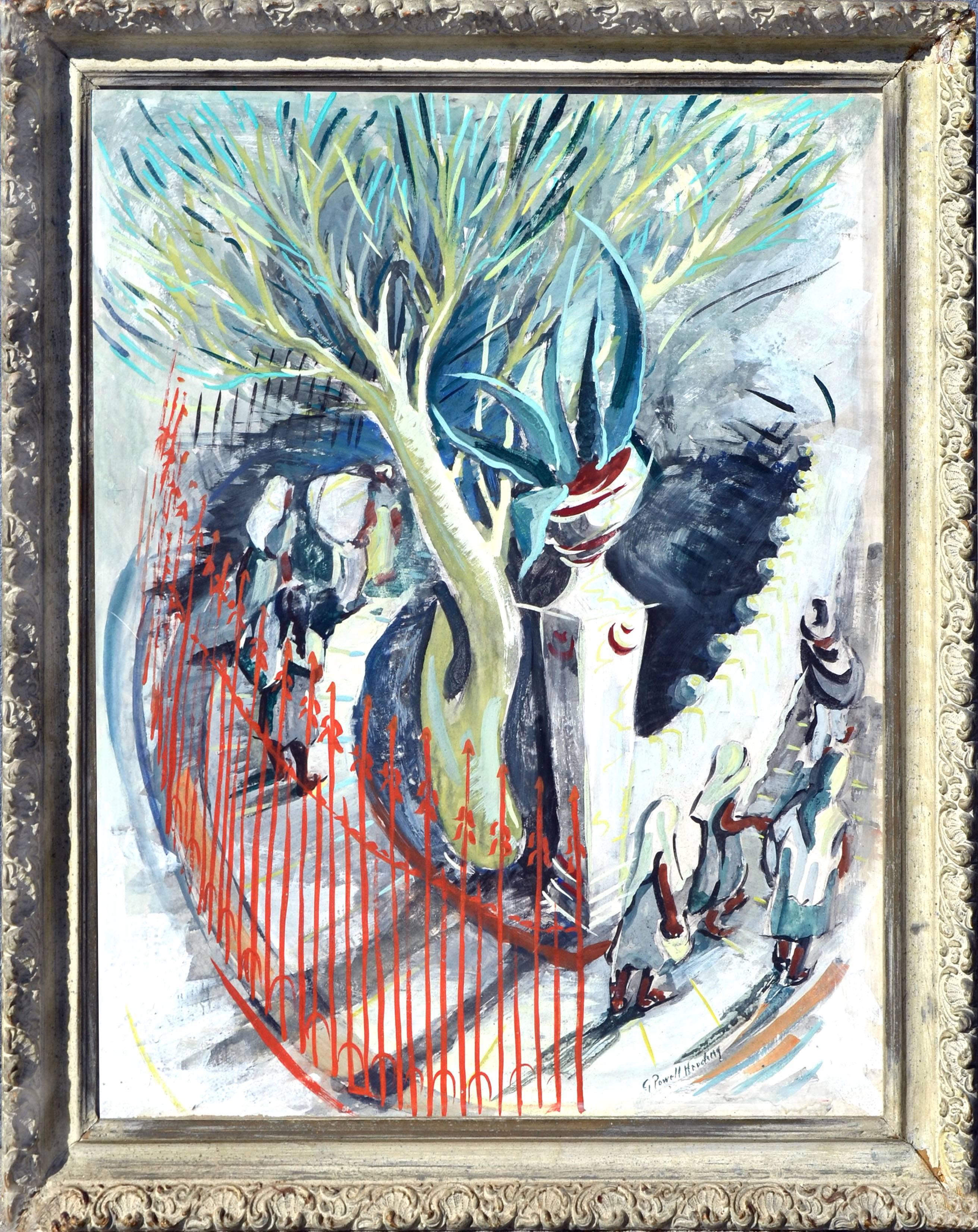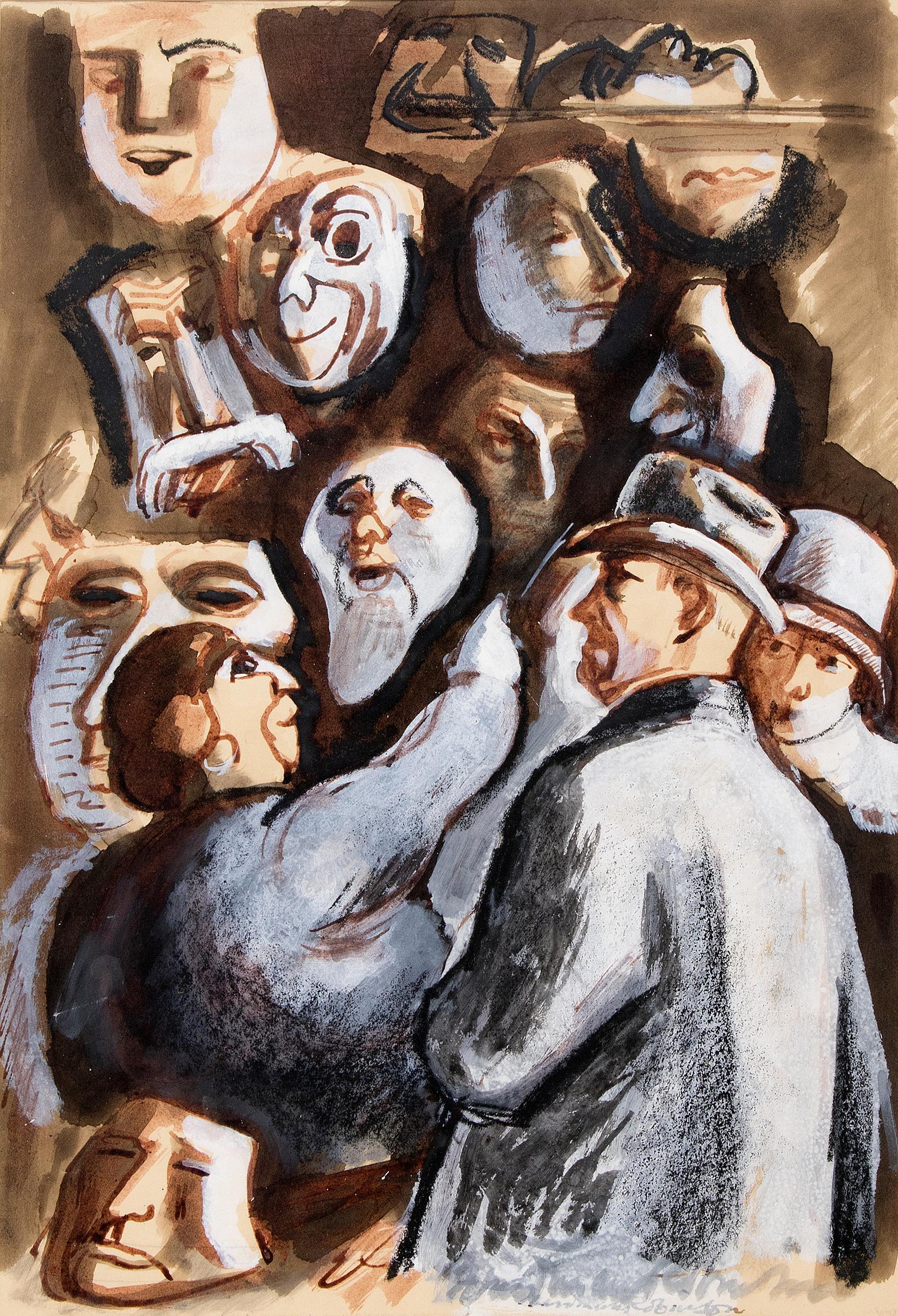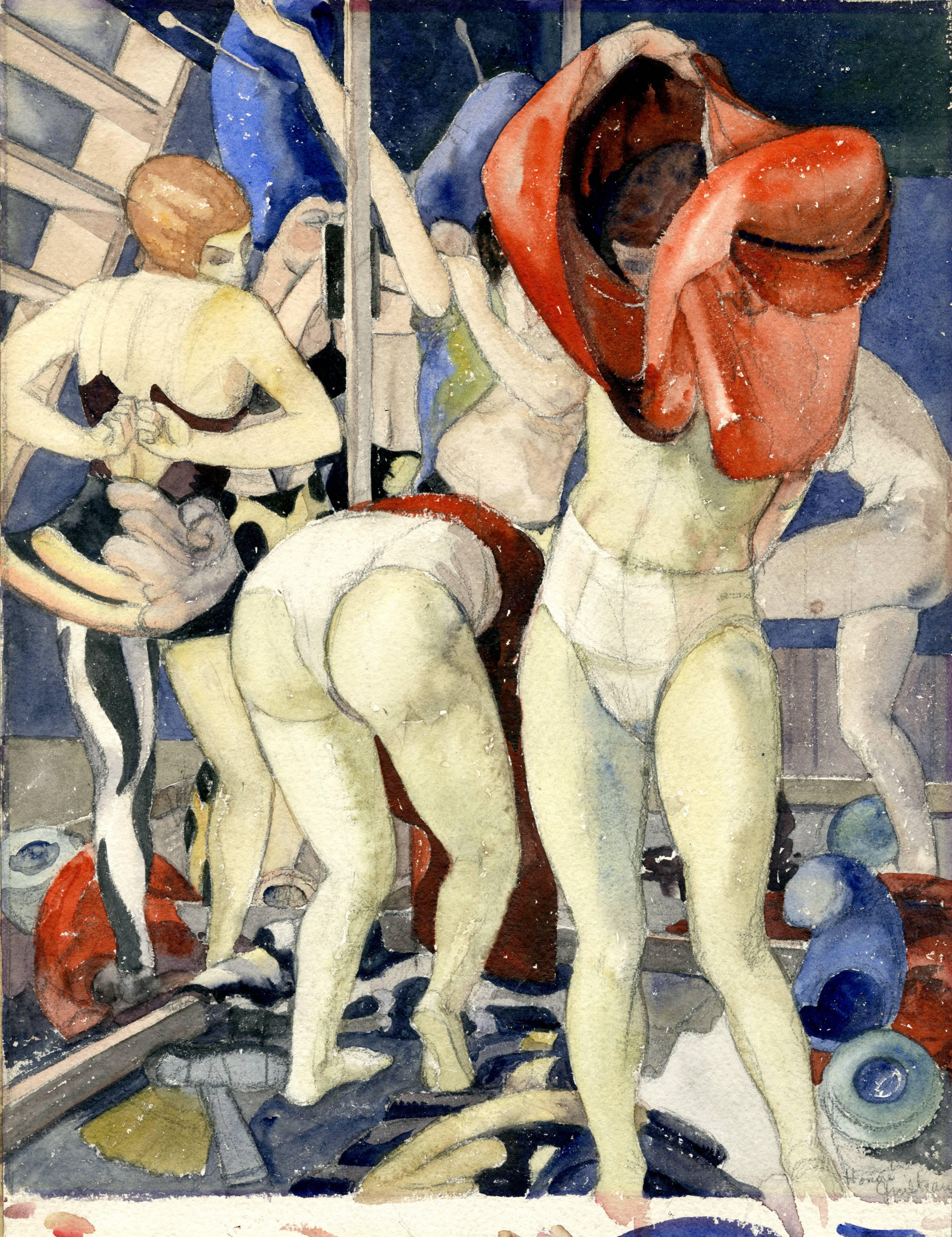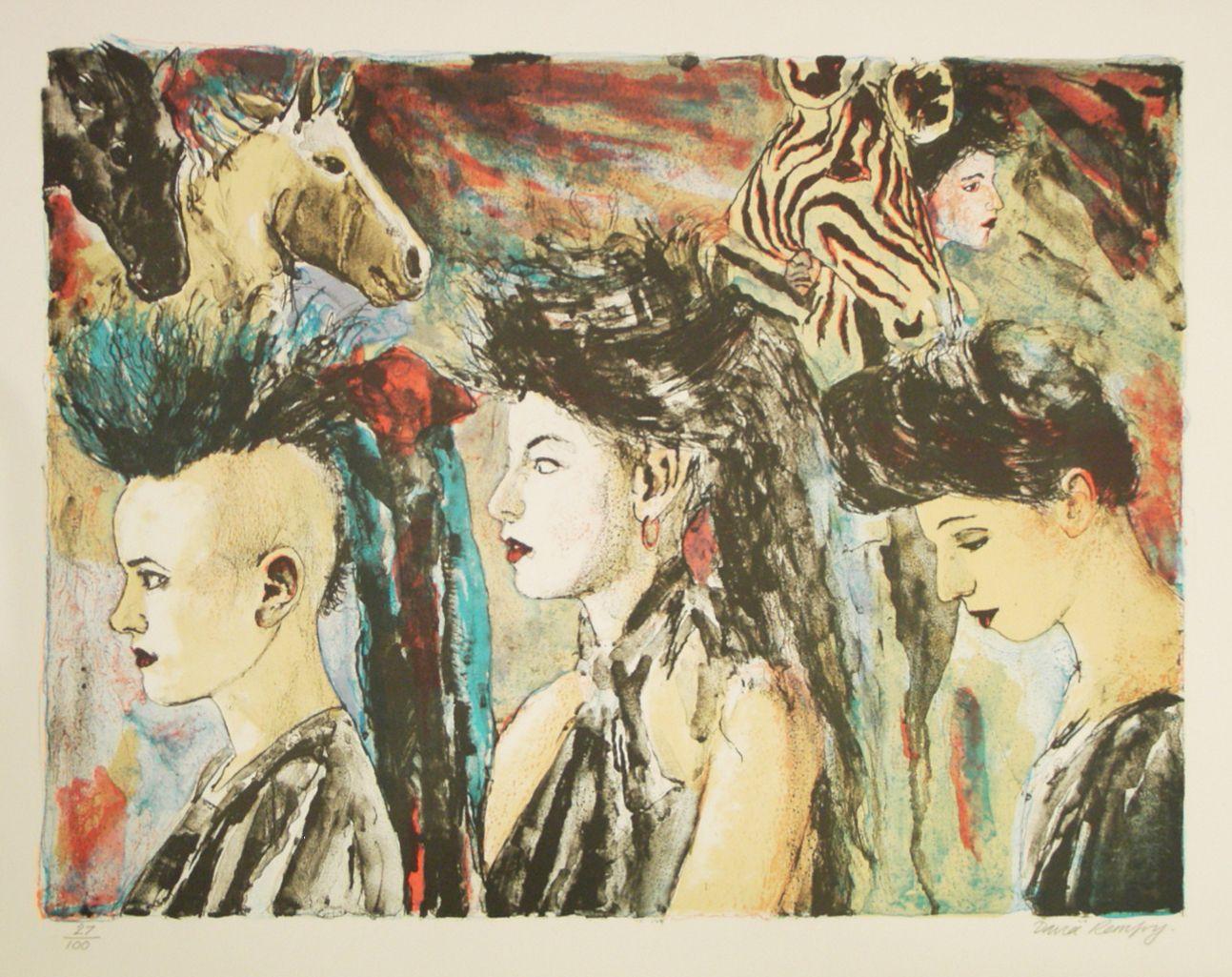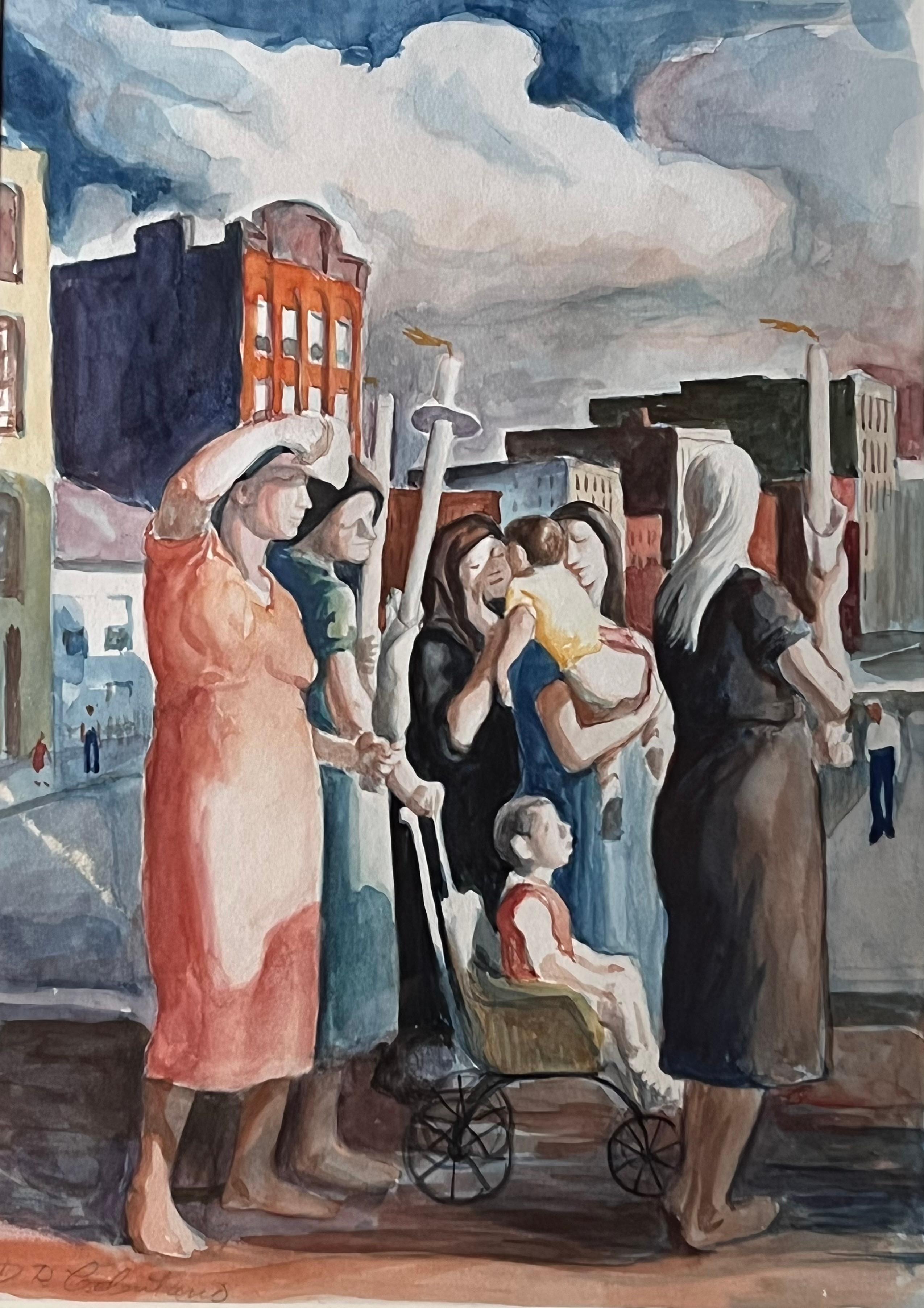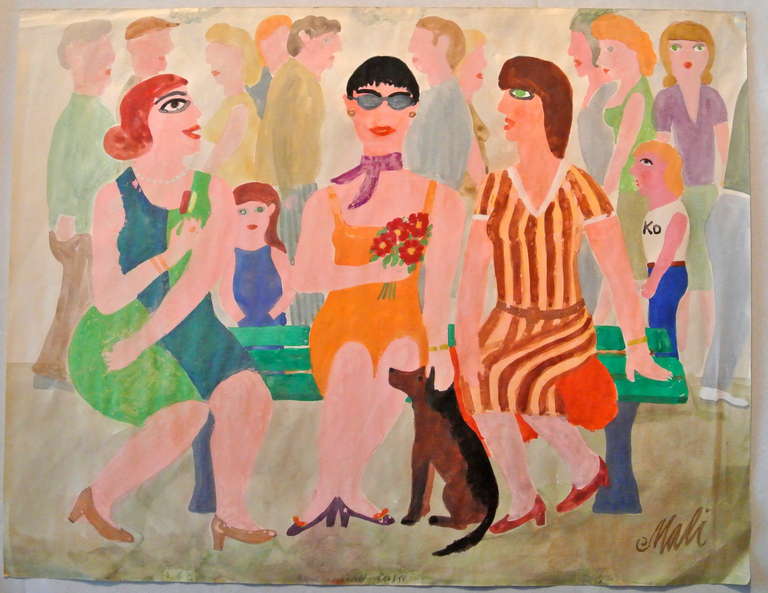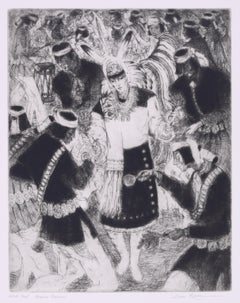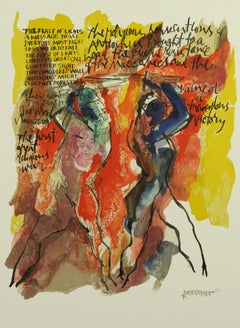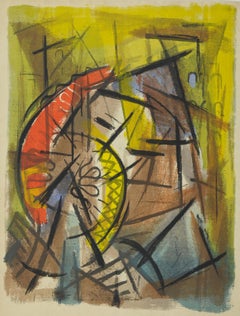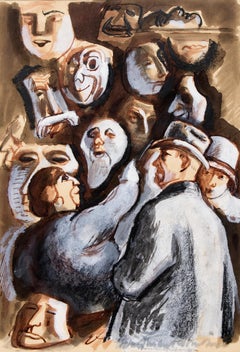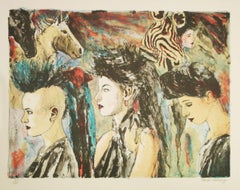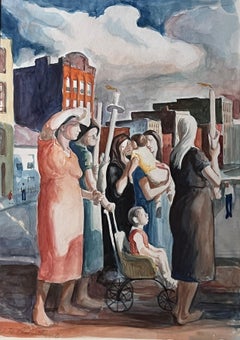Items Similar to Headdress Procession
Want more images or videos?
Request additional images or videos from the seller
1 of 9
Honore GuilbeauHeaddress Processionc 1950s
c 1950s
$1,200
£921.48
€1,057.09
CA$1,686.14
A$1,888.37
CHF 985.32
MX$23,065.64
NOK 12,536.15
SEK 11,816.83
DKK 7,888.92
About the Item
Headdress Procession
Watercolor, c. 1950's
Signed by the artist in ink, lower right
The Headdress Procession occurs every year as part of the Christmas celebrations in Oaxaca.
Guilbeau first went to Mexico in the 1930s.
Provenance:
Joe Kisvardi, a close friend of Guilbeau
Honore Guilbeau
(1907-2006)
An American painter, printmaker and illustrator, Honore Guilbeau first began to exhibit her art in Cleveland and elsewhere around 1930. During the 1930's Depression era she worked mainly in the medium of lithography, contributing at least three such works of art to the Ohio Chapter of the Works Progress Administration (W.P.A.). Instituted by President Roosevelt, the W.P.A. actively assisted artists during this decade of hard economic times. From 1932-1937 Guilbeau was also commissioned on four separate occasions to provide prints for the Cleveland Print Makers “Print-a-Month” series.
During the 1940's and 1950's, Honore Guilbeau illustrated a number of fine books, including works for the Limited Editions Club. Among her works in this field were, Twain's, A Connecticut Yankee in King Arthur's Court, The Adventures of Hajji Baba (1947) and George Meredith's, The Shaving of Shagpat
Courtesy, Greg & Connie Peters
- Creator:Honore Guilbeau ((1907-2006), American)
- Creation Year:c 1950s
- Dimensions:Height: 20 in (50.8 cm)Width: 14 in (35.56 cm)
- Medium:
- Movement & Style:
- Period:
- Condition:
- Gallery Location:Fairlawn, OH
- Reference Number:Seller: FA62501stDibs: LU14013160452
About the Seller
5.0
Recognized Seller
These prestigious sellers are industry leaders and represent the highest echelon for item quality and design.
Gold Seller
Premium sellers maintaining a 4.3+ rating and 24-hour response times
Established in 1978
1stDibs seller since 2013
802 sales on 1stDibs
Typical response time: <1 hour
Associations
International Fine Print Dealers Association
- ShippingRetrieving quote...Shipping from: Fairlawn, OH
- Return Policy
Authenticity Guarantee
In the unlikely event there’s an issue with an item’s authenticity, contact us within 1 year for a full refund. DetailsMoney-Back Guarantee
If your item is not as described, is damaged in transit, or does not arrive, contact us within 7 days for a full refund. Details24-Hour Cancellation
You have a 24-hour grace period in which to reconsider your purchase, with no questions asked.Vetted Professional Sellers
Our world-class sellers must adhere to strict standards for service and quality, maintaining the integrity of our listings.Price-Match Guarantee
If you find that a seller listed the same item for a lower price elsewhere, we’ll match it.Trusted Global Delivery
Our best-in-class carrier network provides specialized shipping options worldwide, including custom delivery.More From This Seller
View AllQuick Change
By Honore Guilbeau
Located in Fairlawn, OH
Quick Change
Watercolor on paper, 1930-1931
Signed lower right: Honore Guilbeau
Illustrated in American Art Review, August 2014, page 84 in an article by Dr. M...
Category
1930s American Modern Figurative Drawings and Watercolors
Materials
Watercolor
Keresan Dancers
By Gene Kloss
Located in Fairlawn, OH
Keresan Dancers
Etching & drypoint, 1962
Signed lower right (see photo)
Inscribed lower left: "Artist's Proof Keresan Dancers"
Depicts Keresan speaking peoples at Sam Felipe Pueblo
Contemporary Puebloans are customarily described as belonging to either the eastern or the western division. The eastern Pueblo villages are in New Mexico along the Rio Grande and comprise groups who speak Tanoan and Keresan languages. Tanoan languages such as Tewa are distantly related to Uto-Aztecan, but Keresan has no known affinities. The western Pueblo villages include the Hopi villages of northern Arizona and the Zuni, Acoma, and Laguna villages, all in western New Mexico.
Born Alice Glasier in Oakland, CA, Kloss grew up amid the worldly bustle of the San Francisco Bay Area. She attended the University of California at Berkeley, graduating with honors in art in 1924. She discovered her talents in intaglio printmaking during a senior-year course in figurative drawing. The professor, Perham Nahl, held up a print from Kloss’ first plate, still damp from the printing process, and announced that she was destined to become a printmaker.
In 1925, Gene married Phillips Kloss, a poet and composer who became her creative partner for life. The match was uncanny, for in her own way Gene, too, was a poet and a composer. Like poetry, her artworks capture a moment in time; like music, her compositions sing with aesthetic harmony. Although she was largely self-taught, Kloss was a printmaking virtuoso.
On their honeymoon the Klosses traveled east from California, camping along the way. They spent two week is Taos Canyon – with a portable printing press cemented to a rock near their campsite – where Gene learned to appreciate the wealth of artistic subject matter in New Mexico. The landscape, the cultures, and the immense sky left an indelible impression on the couple, who returned every summer until they made Taos their permanent home 20 years later.
Throughout her life, Kloss etched more than 625 copper plates, producing editions ranging from five to 250 prints. She pulled every print in every edition herself, manually cranking the wheel of her geared Sturges press until she finally purchased a motorized one when she was in her 70s. Believing that subject matter dictated technique, she employed etching, drypoint, aquatint, mezzotint, roulette, softground, and a variety of experimental approaches, often combining several techniques on the same plate. She also produced both oil and watercolor paintings.
Kloss’ artworks are filled with drama. Her prints employ striking contrasts of darkness and light, and her subjects are often illuminated by mysterious light sources. Though she was a devout realist, there is also a devout abstraction on Kloss’ work that adds an almost mythical quality.
For six decades Kloss documented the cultures of the region-from images of daily life to those of rarely seen ceremonies. She and her husband shared a profound respect for the land and people, which made them welcome among the Native American and Hispanic communities. Kloss never owned a camera but relied instead on observation and recollection. Her works provide an inside look at the cultures she depicted yet at the same time communicate the awe and freshness of an outsider’s perspective.
Although Kloss is best known for her images of Native American and Penitente scenes, she found artistic inspiration wherever she was. During the early years of their marriage, when she and Phil returned to the Bay Area each winter to care for their aging families, she created images of the California coast. And when the Klosses moved to southwestern Colorado in 1965, she etched the mining towns and mountainous landscapes around her.
In 1970 the Klosses returned to Taos and built a house north of town. Though her artwork continued to grow in popularity, she remained faithful to Taos’ Gallery A, where she insisted that owner Mary Sanchez keep the prices of her work reasonable regardless of its market value. Kloss continued to etch until 1985, when declining health made printmaking too difficult.
From her first exhibition at San Francisco’s exclusive Gump’s in 1937 to her 1972 election to full membership in the National Academy of Design, Kloss experienced a selective fame. She received numerous awards, and though she is not as well known as members of the Taos Society of Artists...
Category
1960s American Realist Figurative Prints
Materials
Drypoint
Feast of Lights: Hanukkah
By Abraham Rattner
Located in Fairlawn, OH
Feast of Lights (Poster)
Signed in the stone
17 color lithograph
Published by Kennedy Galleries
Edition: Unknown edition, signed in the stone
There was also a pencil signed edition o...
Category
1970s American Modern Figurative Prints
Materials
Lithograph
The Fan
By Leonard Pytlak
Located in Fairlawn, OH
The Fan
Silkscreen printed in colors, 1950's
Signed and numbered in pencil by the artist (see photos)
Edition: 40 (24/40)
Condition: very good
Image size: 25 1/8 x 19 5/8 inches
Cou...
Category
1950s American Modern Abstract Prints
Materials
Screen
The Model
By William C. Grauer
Located in Fairlawn, OH
The Model
Watercolor on paper, c. 1930
signed lower right (see photo)
Condition: Excellent
A few bits of adhesive residue verso
Colors fresh and unfaded
Housed in a Marin style meta...
Category
1930s American Modern Interior Drawings and Watercolors
Materials
Watercolor
Lower East Side Crowd
By Abraham Walkowitz
Located in Fairlawn, OH
Lower East Side Crowd
Ink and ink wash on paper, c. 1910
Signed in ink lower center edge (see photo)
Signed with the initials lower right corner (see p...
Category
1910s American Modern Figurative Drawings and Watercolors
Materials
Ink
You May Also Like
Cuernavaca Procession 1935, Figurative Landscape
By Goldie Anita Powell Harding
Located in Soquel, CA
Early work of figures moving along the street in Cuernavaca to the Cathedral in Mexico by Goldie Anita Powell Harding (American, 1892-1974). Circa 1935. Tempera on Masonite. In a per...
Category
1930s American Impressionist Figurative Paintings
Materials
Masonite, Tempera
Vendor of Masks, 1930s Original Modernist Gouache Painting of Carnival Scene
By Boardman Robinson
Located in Denver, CO
This captivating 1930s modernist gouache painting by Boardman Robinson (1876–1952), titled The Vendor of Masks, depicts a striking mask vendor’s display with male and female figures,...
Category
1930s American Modern Figurative Paintings
Materials
Gouache
Parade
By David Remfry
Located in Boca Raton, FL
Framed in black measuring 31 x 28 inches total.
Whether obscured by the smoky nightclub lighting or enlivened by the strong color of the Mardi Gras dancers, David Remfry’s life-size...
Category
21st Century and Contemporary Contemporary Figurative Drawings and Water...
Materials
Archival Paper, Lithograph
$3,000
"Going to the Festival" WPA Ashcan 20th Century American Scene Modern Realism
By Daniel Ralph Celentano
Located in New York, NY
"Going to the Festival" WPA Ashcan 20th Century American Scene Modern Realism
Daniel Celentano (1902 - 1980) "Going to the Festival," 14 1/2 x 10 1/2. Watercolor on paper, c. 1930s....
Category
1930s American Realist Figurative Drawings and Watercolors
Materials
Paper, Watercolor
Untitled, Parade
By Hajo Malek
Located in Surfside, FL
German outsider Naive artist born in 1922. has exhibited in Germany in 1969 worked in painting, gouache and linocuts. Expressionist Folk Art style.
Category
20th Century Outsider Art Figurative Drawings and Watercolors
Materials
Watercolor, Gouache
OPISSO PROCESSION.VIRGIN original gouache painting
By Alfredo Opisso
Located in CORAL GABLES - MIAMI, FL
OPISSO CARDONA, Alfredo (Barcelona, 1907 - Mataro, Barcelona, 1980).
Painter and illustrator, was the son of Ricardo Opisso and nephew of Joan Cardona, who gave him the first lesson...
Category
1970s Expressionist Interior Paintings
Materials
Gouache, Cardboard
